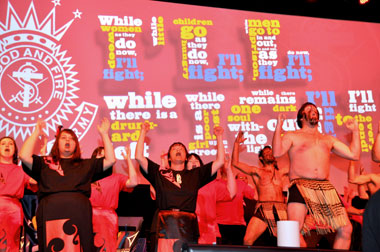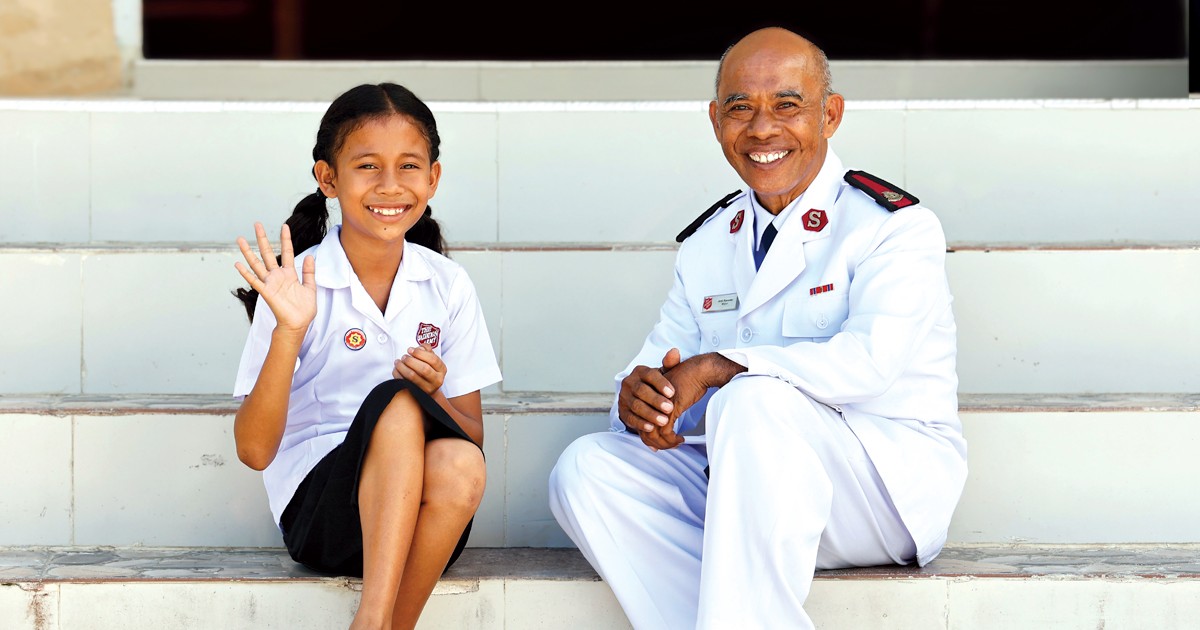Read updates on The Salvation Army's relief work in Haiti and the Caribbean, plus about the Army's ministry in Papua New Guinea, New Zealand and South Africa.
Papua New Guinea Growth Recognized at Congress
By Dawn Beeson
Ten years ago there was no Salvation Army presence in the Sepik area of Papua New Guinea but today the Army's work is growing more quickly there than in any other part of the country. The latest step forward for work in the area was the first Sepik District Congress, held in Wewak for 300 Salvationists.
Congress leaders were Commissioner Andrew Kalai, Papua New Guinea territorial commander, Chief Secretary, Lieutenant-Colonel Neil Webb, chief secretary, and Majors Bugave and Tomuna Kada, district officer and district director of women's ministries.
Salvation Army work in Sepik began after disaster relief was provided to people affected by a tsunami in Aitape. An outreach was held and one man accepted the Lord and decided to return to his village and start The Salvation Army by himself.
The corps at Wewak has since been joined by 17 fellowships (outposts), a district headquarters and currently a large water project is being funded through Japan International Community Aid and The Salvation Army in Japan.
Salvation Army Represented at Lausanne Congress, South Africa
By Lieutenant-Colonel Richard Munn
The Salvation Army had a strong representation at the Third Lausanne Congress on World Evangelization held from October 16 to 25 in Cape Town, South Africa. Eighteen delegates from nine Salvation Army territories and International Headquarters attended the event, continuing the strong bonds between the Lausanne Movement and the Army.
Originating in Lausanne, Switzerland, in 1974, through the vision of Billy Graham and scholarship of John Stott, the Lausanne Covenant stands as an evangelism standard-bearer for evangelical Christianity. The second congress in Manila, the Philippines, in 1989 expanded the original call for evangelistic clarity with corresponding social action. It is thus a natural setting in which The Salvation Army is strongly represented.
Commissioner Christine MacMillan, director, International Social Justice Commission, conducted a congress workshop on sex trafficking and was a featured speaker during the Tuesday morning plenary session.
Haka is a Highlight of New Zealand, Fiji and Tonga Territorial Congress
By Major Christina Tyson
 A special Maori haka based on the words of General William Booth was a highlight of the New Zealand, Fiji and Tonga Territorial Congress which saw Salvationists dedicate themselves to advance the mission of The Salvation Army.
A special Maori haka based on the words of General William Booth was a highlight of the New Zealand, Fiji and Tonga Territorial Congress which saw Salvationists dedicate themselves to advance the mission of The Salvation Army.
The congress—in Auckland, New Zealand—included the announcement of the territory's mission goals which will be in place through to 2013:
1. Make dynamic disciples of Jesus.
2. Increase the number of soldiers.
3. Take significant steps to eradicate poverty and injustice.
4. Be a connected, streamlined and mission-focused Army.
The debut of a Maori war haka (traditional warrior dance) inspired by Salvation Army Founder General William Booth's famous “I'll Fight!” speech—in which he spoke about fighting against injustice—was a thrilling highlight. “Ka whawai tonu au! I'll fight to the very end!” the group promised.
In his closing address, Commissioner Don Bell, territorial commander, urged everyone to “Serve the Lord with all faithfulness.” This was God's call to The Salvation Army today, he said.
The congress was preceded by 'Just Action,' the territory's largest-ever social justice conference. Five hundred Just Action delegates, many of whom work for hope and healing every day, focused on bringing change to their communities, their nations and the world.
Salvation Army Clinic in Haiti Assists Cholera Patients
By Major Ron Busroe
In recent weeks, Haiti has experienced a rise in the number of people contracting the water-borne disease, cholera.
The Salvation Army clinic in Port-au-Prince, Haiti, led by Dr. Danielle Prosper, is surrounded by an Internally Displaced Persons camp, managed by The Salvation Army in partnership with Concern Worldwide and Viva Rio. Currently, more than 13,000 residents are living in difficult circumstances.
The camp has a sufficient supply of safe drinking water and toilets, combined with a good drainage system. Classes have taught women and children the importance of thorough hand washing and cooking of food.
The Salvation Army is communicating with Haitian health officials regarding the government's recommended course of treatment for victims and also to acquire an adequate supply of vaccine for medical staff and response workers.
The Salvation Army Responds as Tomas Storms Across the Caribbean
The Salvation Army across the Caribbean is responding to damage caused by Tropical Storm Tomas.
In Barbados, the government—through the Ministry of Agriculture—officially wrote to Major Dewhurst Jonas, divisional commander, to express appreciation for The Salvation Army's quick and helpful response. The Army provided hot meals to shelters and assisted individuals with food parcels and other basic necessities.
Major Jonas reports: “The worst storm to hit Barbados since Hurricane Janet in 1955 ... came at 70 miles per hour, five miles per hour less than a category one hurricane, but that did not minimise the damage that Tomas inflicted on the island of Barbados and later on in the day in St. Lucia.”
In St. Lucia, where 14 lives were lost in the storm, the Army is working closely with NEMO, the government's National Emergency Measures Organization, to provide assistance to those in need. So far, Salvation Army teams have offered counselling and the daily feeding program to the homeless in the city of Castries has been extended to provide food to some of the utility workers who were undertaking repairs in the north.
In St. Vincent, The Salvation Army is supporting government-organized relief efforts and offering assistance where possible.
Papua New Guinea Growth Recognized at Congress
By Dawn Beeson
Ten years ago there was no Salvation Army presence in the Sepik area of Papua New Guinea but today the Army's work is growing more quickly there than in any other part of the country. The latest step forward for work in the area was the first Sepik District Congress, held in Wewak for 300 Salvationists.
Congress leaders were Commissioner Andrew Kalai, Papua New Guinea territorial commander, Chief Secretary, Lieutenant-Colonel Neil Webb, chief secretary, and Majors Bugave and Tomuna Kada, district officer and district director of women's ministries.
Salvation Army work in Sepik began after disaster relief was provided to people affected by a tsunami in Aitape. An outreach was held and one man accepted the Lord and decided to return to his village and start The Salvation Army by himself.
The corps at Wewak has since been joined by 17 fellowships (outposts), a district headquarters and currently a large water project is being funded through Japan International Community Aid and The Salvation Army in Japan.
Salvation Army Represented at Lausanne Congress, South Africa
By Lieutenant-Colonel Richard Munn
The Salvation Army had a strong representation at the Third Lausanne Congress on World Evangelization held from October 16 to 25 in Cape Town, South Africa. Eighteen delegates from nine Salvation Army territories and International Headquarters attended the event, continuing the strong bonds between the Lausanne Movement and the Army.
Originating in Lausanne, Switzerland, in 1974, through the vision of Billy Graham and scholarship of John Stott, the Lausanne Covenant stands as an evangelism standard-bearer for evangelical Christianity. The second congress in Manila, the Philippines, in 1989 expanded the original call for evangelistic clarity with corresponding social action. It is thus a natural setting in which The Salvation Army is strongly represented.
Commissioner Christine MacMillan, director, International Social Justice Commission, conducted a congress workshop on sex trafficking and was a featured speaker during the Tuesday morning plenary session.
Haka is a Highlight of New Zealand, Fiji and Tonga Territorial Congress
By Major Christina Tyson
 A special Maori haka based on the words of General William Booth was a highlight of the New Zealand, Fiji and Tonga Territorial Congress which saw Salvationists dedicate themselves to advance the mission of The Salvation Army.
A special Maori haka based on the words of General William Booth was a highlight of the New Zealand, Fiji and Tonga Territorial Congress which saw Salvationists dedicate themselves to advance the mission of The Salvation Army.
The congress—in Auckland, New Zealand—included the announcement of the territory's mission goals which will be in place through to 2013:
1. Make dynamic disciples of Jesus.
2. Increase the number of soldiers.
3. Take significant steps to eradicate poverty and injustice.
4. Be a connected, streamlined and mission-focused Army.
The debut of a Maori war haka (traditional warrior dance) inspired by Salvation Army Founder General William Booth's famous “I'll Fight!” speech—in which he spoke about fighting against injustice—was a thrilling highlight. “Ka whawai tonu au! I'll fight to the very end!” the group promised.
In his closing address, Commissioner Don Bell, territorial commander, urged everyone to “Serve the Lord with all faithfulness.” This was God's call to The Salvation Army today, he said.
The congress was preceded by 'Just Action,' the territory's largest-ever social justice conference. Five hundred Just Action delegates, many of whom work for hope and healing every day, focused on bringing change to their communities, their nations and the world.
Salvation Army Clinic in Haiti Assists Cholera Patients
By Major Ron Busroe
In recent weeks, Haiti has experienced a rise in the number of people contracting the water-borne disease, cholera.
The Salvation Army clinic in Port-au-Prince, Haiti, led by Dr. Danielle Prosper, is surrounded by an Internally Displaced Persons camp, managed by The Salvation Army in partnership with Concern Worldwide and Viva Rio. Currently, more than 13,000 residents are living in difficult circumstances.
The camp has a sufficient supply of safe drinking water and toilets, combined with a good drainage system. Classes have taught women and children the importance of thorough hand washing and cooking of food.
The Salvation Army is communicating with Haitian health officials regarding the government's recommended course of treatment for victims and also to acquire an adequate supply of vaccine for medical staff and response workers.
The Salvation Army Responds as Tomas Storms Across the Caribbean
The Salvation Army across the Caribbean is responding to damage caused by Tropical Storm Tomas.
In Barbados, the government—through the Ministry of Agriculture—officially wrote to Major Dewhurst Jonas, divisional commander, to express appreciation for The Salvation Army's quick and helpful response. The Army provided hot meals to shelters and assisted individuals with food parcels and other basic necessities.
Major Jonas reports: “The worst storm to hit Barbados since Hurricane Janet in 1955 ... came at 70 miles per hour, five miles per hour less than a category one hurricane, but that did not minimise the damage that Tomas inflicted on the island of Barbados and later on in the day in St. Lucia.”
In St. Lucia, where 14 lives were lost in the storm, the Army is working closely with NEMO, the government's National Emergency Measures Organization, to provide assistance to those in need. So far, Salvation Army teams have offered counselling and the daily feeding program to the homeless in the city of Castries has been extended to provide food to some of the utility workers who were undertaking repairs in the north.
In St. Vincent, The Salvation Army is supporting government-organized relief efforts and offering assistance where possible.









Leave a Comment